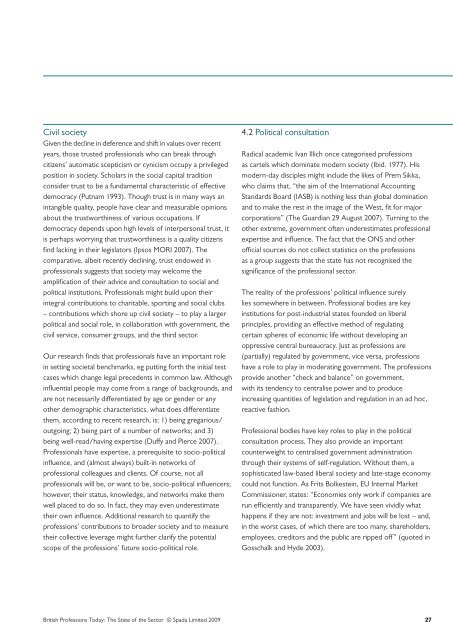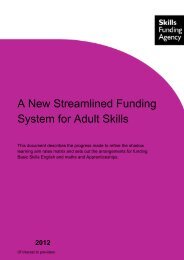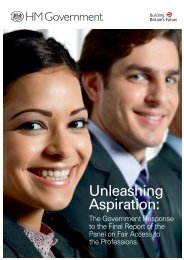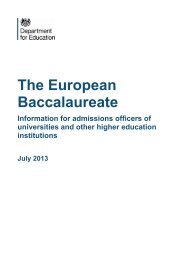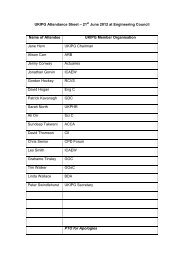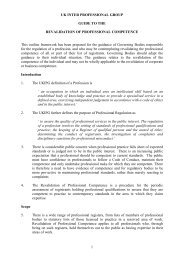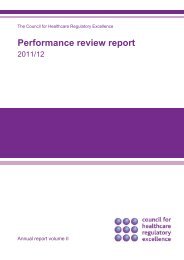BRITISH PROFESSIONS TODAY: THE STATE OF ... - Property Week
BRITISH PROFESSIONS TODAY: THE STATE OF ... - Property Week
BRITISH PROFESSIONS TODAY: THE STATE OF ... - Property Week
Create successful ePaper yourself
Turn your PDF publications into a flip-book with our unique Google optimized e-Paper software.
Civil society<br />
Given the decline in deference and shift in values over recent<br />
years, those trusted professionals who can break through<br />
citizens’ automatic scepticism or cynicism occupy a privileged<br />
position in society. Scholars in the social capital tradition<br />
consider trust to be a fundamental characteristic of effective<br />
democracy (Putnam 1993). Though trust is in many ways an<br />
intangible quality, people have clear and measurable opinions<br />
about the trustworthiness of various occupations. If<br />
democracy depends upon high levels of interpersonal trust, it<br />
is perhaps worrying that trustworthiness is a quality citizens<br />
find lacking in their legislators (Ipsos MORI 2007). The<br />
comparative, albeit recently declining, trust endowed in<br />
professionals suggests that society may welcome the<br />
amplification of their advice and consultation to social and<br />
political institutions. Professionals might build upon their<br />
integral contributions to charitable, sporting and social clubs<br />
– contributions which shore up civil society – to play a larger<br />
political and social role, in collaboration with government, the<br />
civil service, consumer groups, and the third sector.<br />
Our research finds that professionals have an important role<br />
in setting societal benchmarks, eg putting forth the initial test<br />
cases which change legal precedents in common law. Although<br />
influential people may come from a range of backgrounds, and<br />
are not necessarily differentiated by age or gender or any<br />
other demographic characteristics, what does differentiate<br />
them, according to recent research, is: 1) being gregarious/<br />
outgoing; 2) being part of a number of networks; and 3)<br />
being well-read/having expertise (Duffy and Pierce 2007).<br />
Professionals have expertise, a prerequisite to socio-political<br />
influence, and (almost always) built-in networks of<br />
professional colleagues and clients. Of course, not all<br />
professionals will be, or want to be, socio-political influencers;<br />
however, their status, knowledge, and networks make them<br />
well placed to do so. In fact, they may even underestimate<br />
their own influence. Additional research to quantify the<br />
professions’ contributions to broader society and to measure<br />
their collective leverage might further clarify the potential<br />
scope of the professions’ future socio-political role.<br />
4.2 Political consultation<br />
Radical academic Ivan Illich once categorised professions<br />
as cartels which dominate modern society (Ibid. 1977). His<br />
modern-day disciples might include the likes of Prem Sikka,<br />
who claims that, “the aim of the International Accounting<br />
Standards Board (IASB) is nothing less than global domination<br />
and to make the rest in the image of the West, fit for major<br />
corporations” (The Guardian 29 August 2007). Turning to the<br />
other extreme, government often underestimates professional<br />
expertise and influence. The fact that the ONS and other<br />
official sources do not collect statistics on the professions<br />
as a group suggests that the state has not recognised the<br />
significance of the professional sector.<br />
The reality of the professions’ political influence surely<br />
lies somewhere in between. Professional bodies are key<br />
institutions for post-industrial states founded on liberal<br />
principles, providing an effective method of regulating<br />
certain spheres of economic life without developing an<br />
oppressive central bureaucracy. Just as professions are<br />
(partially) regulated by government, vice versa, professions<br />
have a role to play in moderating government. The professions<br />
provide another “check and balance” on government,<br />
with its tendency to centralise power and to produce<br />
increasing quantities of legislation and regulation in an ad hoc,<br />
reactive fashion.<br />
Professional bodies have key roles to play in the political<br />
consultation process. They also provide an important<br />
counterweight to centralised government administration<br />
through their systems of self-regulation. Without them, a<br />
sophisticated law-based liberal society and late-stage economy<br />
could not function. As Frits Bolkestein, EU Internal Market<br />
Commissioner, states: “Economies only work if companies are<br />
run efficiently and transparently. We have seen vividly what<br />
happens if they are not: investment and jobs will be lost – and,<br />
in the worst cases, of which there are too many, shareholders,<br />
employees, creditors and the public are ripped off ” (quoted in<br />
Gosschalk and Hyde 2003).<br />
British Professions Today: The State of the Sector © Spada Limited 2009 27


